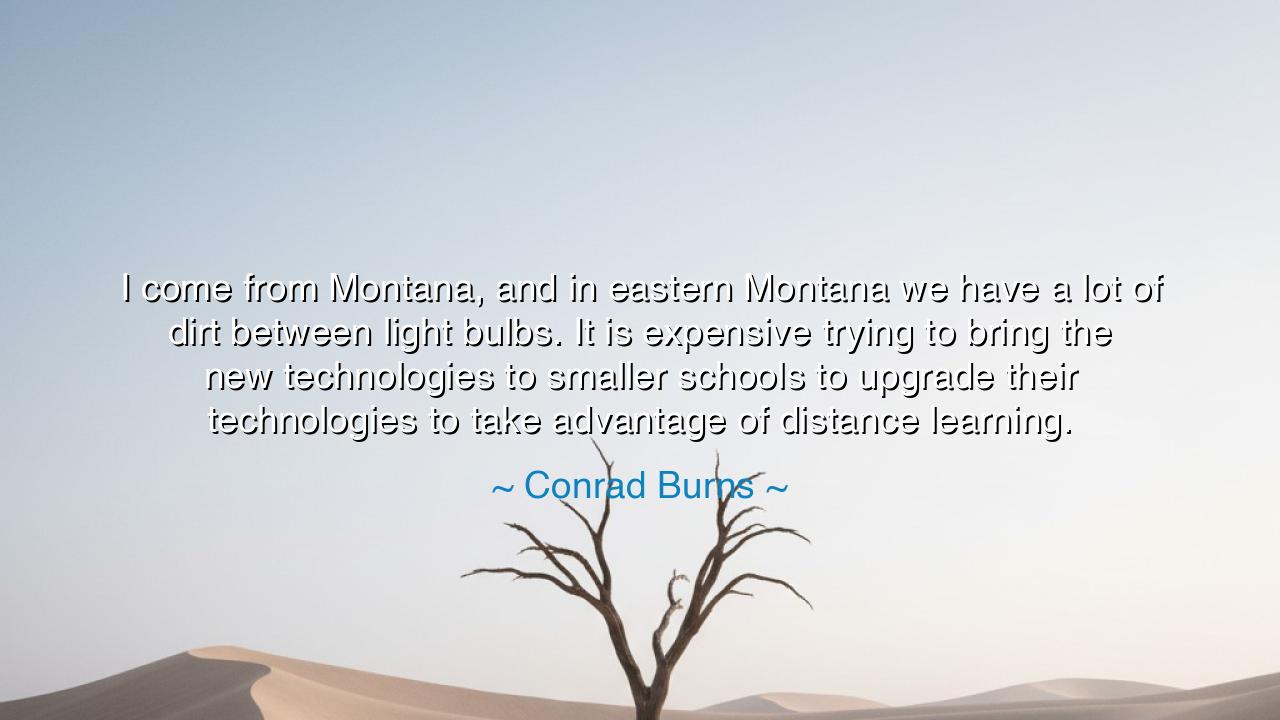
I come from Montana, and in eastern Montana we have a lot of dirt
I come from Montana, and in eastern Montana we have a lot of dirt between light bulbs. It is expensive trying to bring the new technologies to smaller schools to upgrade their technologies to take advantage of distance learning.






In a voice grounded in the dust and wind of the American plains, Conrad Burns once said, “I come from Montana, and in eastern Montana we have a lot of dirt between light bulbs. It is expensive trying to bring the new technologies to smaller schools to upgrade their technologies to take advantage of distance learning.” These words, though spoken with simplicity, carry a depth of meaning that transcends geography and time. They speak not only of the rural isolation of his homeland, but of the greater struggle of human progress—the eternal tension between innovation and access, between the shining towers of advancement and the quiet corners of the world left in their shadow. Burns reminds us that enlightenment—whether through electricity or education—must not stop at the city’s edge.
The origin of this quote lies in Burns’s life as a senator and a son of the rural West, a man who knew the vastness of the land and the loneliness of distance. In the open prairies of eastern Montana, the spaces between neighbors stretch far, and the glow of light bulbs—symbols of both technology and civilization—scatters sparsely across the horizon. His phrase, “a lot of dirt between light bulbs,” is not merely poetic—it is a truth of the frontier. It evokes the isolation of small towns and schools struggling to connect with the broader world, and it reflects the challenge of bringing modern knowledge to those whose distance from the centers of power and progress leaves them in the twilight. Burns’s words are both a lament and a call to action: a reminder that every child, no matter how remote their home, deserves a share in the world’s growing light.
The light bulb, in his metaphor, is more than a fixture of modern life—it is the ancient symbol of enlightenment, of discovery, of human advancement. In the days of Thomas Edison, its glow marked the beginning of a new era, when darkness could no longer dictate the boundaries of civilization. Yet Burns, speaking a century later, reminds us that the spread of that light—both literal and figurative—remains incomplete. Technology has advanced beyond imagination, but equality of access has not kept pace. His mention of the cost of “bringing new technologies to smaller schools” echoes a universal truth: progress often favors the powerful, while the periphery waits in patience.
History offers many such lessons. Consider the story of rural electrification in America during the 1930s. For decades, cities gleamed with electric light while farms and small towns remained shrouded in darkness. It was not until the Rural Electrification Act of 1936, born from the New Deal, that the countryside began to catch up. Even then, it took years of effort, courage, and unity for the light to reach every farmhouse and schoolhouse across the plains. Burns’s words, spoken in the age of the internet, echo the same spirit of that earlier struggle—only now, the wires of progress are digital rather than electric, and the darkness we battle is not of night, but of knowledge.
Yet within his quote lies not bitterness, but determination. Burns’s acknowledgment of difficulty—“it is expensive trying to bring the new technologies to smaller schools”—is not an excuse, but a recognition of the challenge before us. He speaks with the humility of one who understands that great achievements require sacrifice, and that the work of connection is not only technological, but moral. For to bridge the gap between light bulbs is to bridge the gap between lives—to ensure that the farmer’s child has the same chance to learn, to dream, to rise, as the child born beneath the bright towers of the city.
In this way, Burns’s wisdom becomes timeless. His “dirt between light bulbs” is not only a measure of physical distance—it is a symbol of the separations that persist in every age: between the rich and the poor, the connected and the forgotten, the centers of power and the margins of humanity. The task of civilization has always been to close these distances, to carry light where there is darkness, to ensure that the gifts of progress serve all and not the few. Each generation must decide whether to build bridges or to let the gaps widen.
Let this be the lesson his words carry into the future: that progress means little unless it reaches everyone. The measure of a society is not in the brilliance of its brightest cities, but in how far its light travels into the wilderness. It is the duty of the enlightened not to hoard illumination, but to share it—to bring the lamps of learning, technology, and hope to those whose lives still lie between the scattered bulbs of advancement.
So, my children of tomorrow, remember Conrad Burns’s wisdom: the distance between light bulbs is not only a problem of geography, but of justice. Wherever you find darkness—be it in ignorance, isolation, or inequality—be the one to bring light. For the truest measure of civilization is not how much it shines, but how widely its glow can reach. When the last corner of the land is lit with opportunity, then, and only then, will humanity truly be one beneath the same bright sky.






AAdministratorAdministrator
Welcome, honored guests. Please leave a comment, we will respond soon